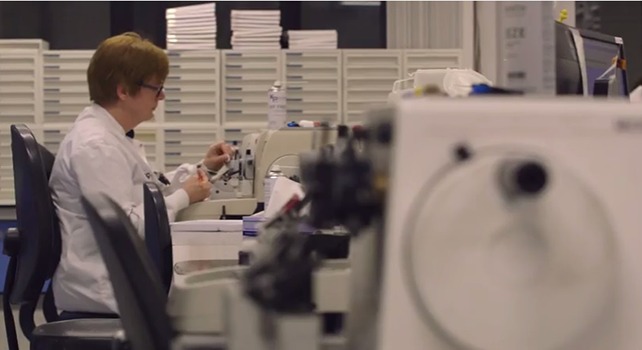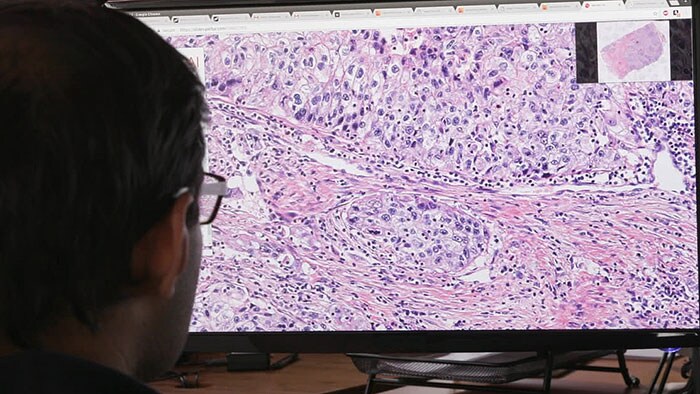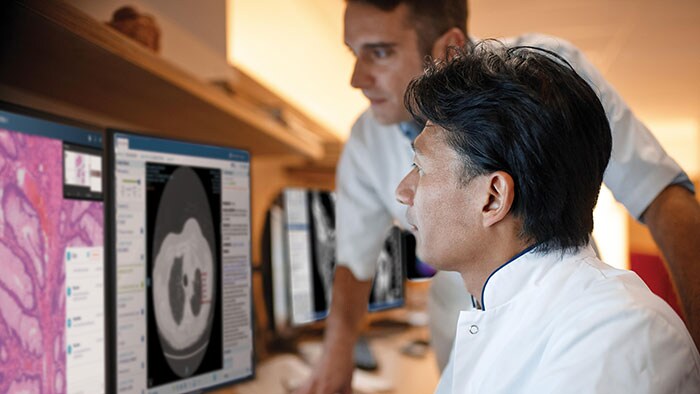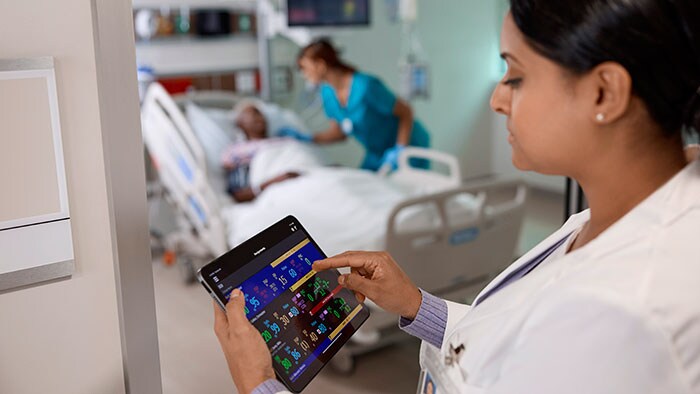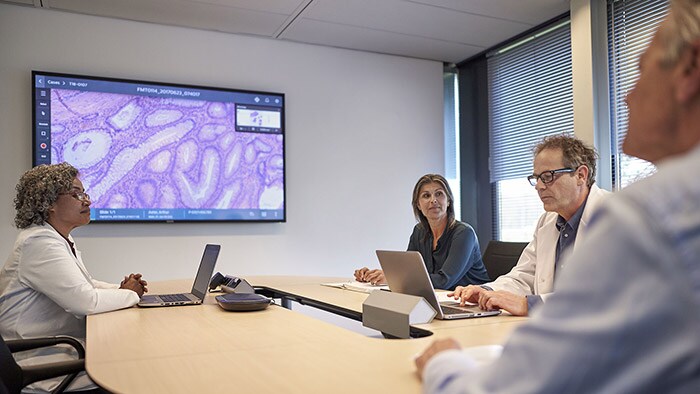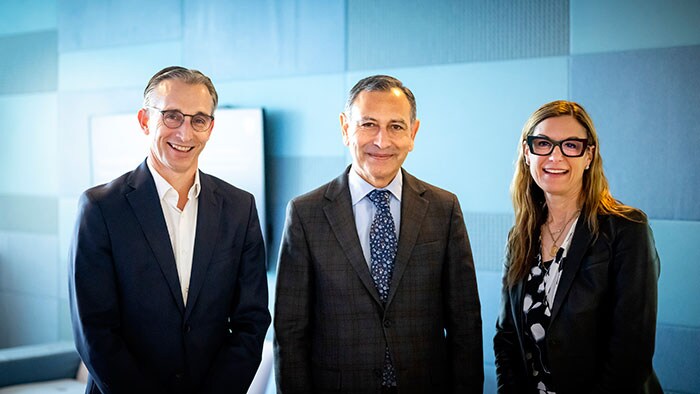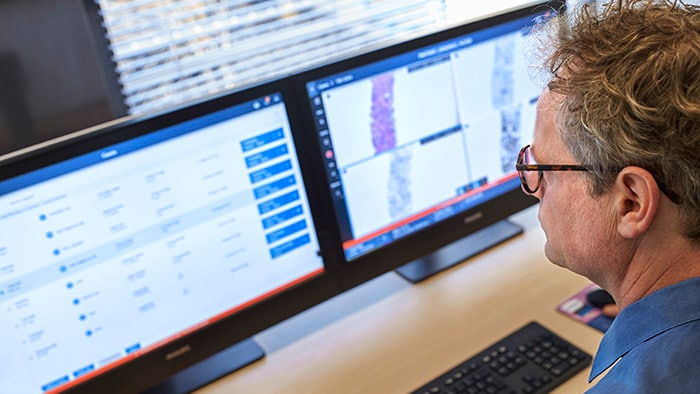March 29, 2017
Philips and PathAI team up to improve breast cancer diagnosis using artificial intelligence technology in �big data� pathology research
Amsterdam, the Netherlands – Royal Philips (NYSE: PHG, AEX: PHIA), a global leader in health technology, and PathAI, a company that develops artificial intelligence technology for pathology, are collaborating with the aim to develop solutions that improve the precision and accuracy of routine diagnosis of cancer and other diseases. The partnership aims to build deep learning applications in computational pathology enabling this form of artificial intelligence to be applied to massive pathology data sets to better inform diagnostic and treatment decisions. The initial focus of this effort is on developing applications to automatically detect and quantify cancerous lesions in breast cancer tissue. The accurate quantitative assessment of cancer involvement and scale is a central and challenging task for pathologists. This task, while critical to diagnosis and treatment, is very time-consuming and can place increased pressure on pathologists to conduct slide readings and analysis faster. Historically, pathologists have manually reviewed and analyzed tumor tissue slides using a microscope, but the rising shortage of pathologists and the increase in cancer caseloads1,2 require digital pathology solutions and smart image analysis software that reduce pathologists’ routine workload, improve diagnostic accuracy and precision, and reduce error rates. “Breast cancer is the most common cancer in women worldwide, with over 250,000 new cases3 diagnosed every year in the U.S.,” says Andy Beck, CEO of PathAI. “Our goal is to help patients receive fast, accurate diagnosis and support treating physicians to deliver optimal care by empowering pathologists with decision support tools powered by artificial intelligence. For example, identifying the presence or absence of cancer in lymph nodes is a routine and critically important task for a pathologist. However, it can be extremely laborious using conventional methods. Research indicates that pathologists supported with computational tools could be both more accurate and faster.” Deep learning is an algorithmic technique that is revolutionizing what is possible in areas such as finance, communication, automotive, natural language processing, computer vision and more. It allows computers to analyze vast amounts of data and automatically detect patterns and make accurate predictions. Philips has already implemented deep learning in its clinical informatics solutions for radiology such as Illumeo and IntelliSpace Portal 9.0. With the proliferation of digital pathology and whole slide imaging (WSI), computers will soon be able to learn and unlock the ‘big data’ potential of thousands of digital tumor tissue (histology) images and related patient data. As a pioneer in the digitization of pathology, Philips has created a leading digital pathology business through strategic investments, partnerships and technology licenses. “Digitizing images in pathology has the potential to transform the field by unlocking new opportunities in image recognition,” said Russ Granzow, General Manager of Philips Digital Pathology Solutions. “With computational pathology and the application of artificial intelligence there is an opportunity to increase efficiencies, enable greater accuracy and precision, and allow pathologists to see things and access insights not previously available.” Last year, Dr. Andy Beck and his colleagues from Harvard Medical School and MIT, won a global challenge on the detection of metastatic lesions in lymph nodes with a performance that rivals human error rates consistently. Now Philips and PathAI are partnering to ensure such highly promising technologies could find a practical application in aiding pathologists in their effort to deliver high quality, high confidence diagnosis. 1 The Royal College of Pathologists, https://www.rcpath.org/profession/workforce/workforce-planning.html, Accessed December 2016., 2 International Agency for Research on Cancer and Cancer Research UK. World Cancer Factsheet. Cancer Research UK, London, 2014.
About Royal Philips
Royal Philips (NYSE: PHG, AEX: PHIA) is a leading health technology company focused on improving people's health and enabling better outcomes across the health continuum from healthy living and prevention, to diagnosis, treatment and home care. Philips leverages advanced technology and deep clinical and consumer insights to deliver integrated solutions. Headquartered in the Netherlands, the company is a leader in diagnostic imaging, image-guided therapy, patient monitoring and health informatics, as well as in consumer health and home care. Philips' health technology portfolio generated 2016 sales of EUR 17.4 billion and employs approximately 71,000 employees with sales and services in more than 100 countries. News about Philips can be found at www.philips.com/newscenter.
Topics
Contacts

Hans Driessen
Philips Global Press Office Tel: +31 6 10610417
You are about to visit a Philips global content page
Continue
Steve Klink
Philips Global Press Office Tel: +31 6 10888824
You are about to visit a Philips global content page
ContinueMedia assets
Press releases
Get our press releases by e-mail
You are about to visit a Philips global content page
Continue